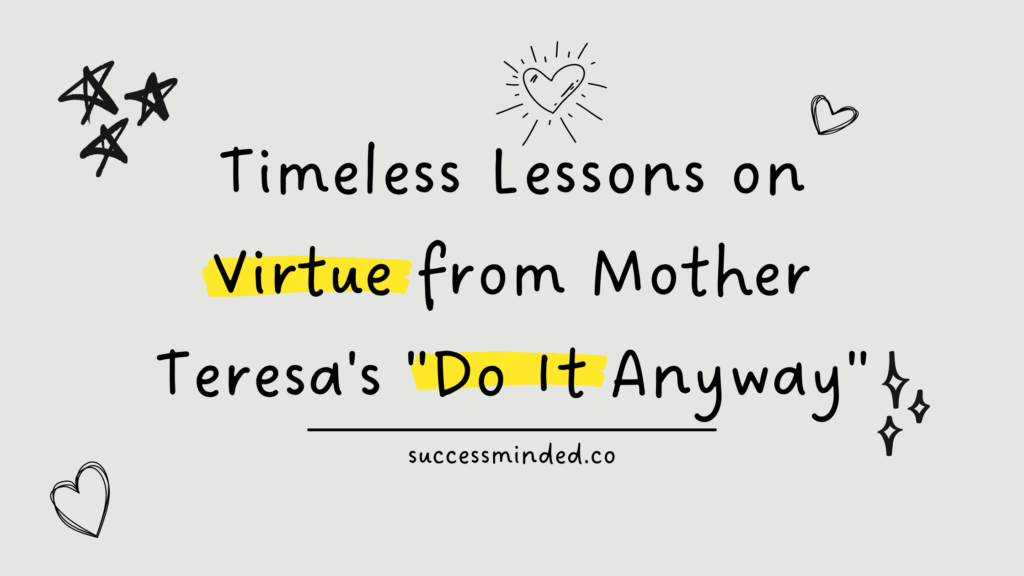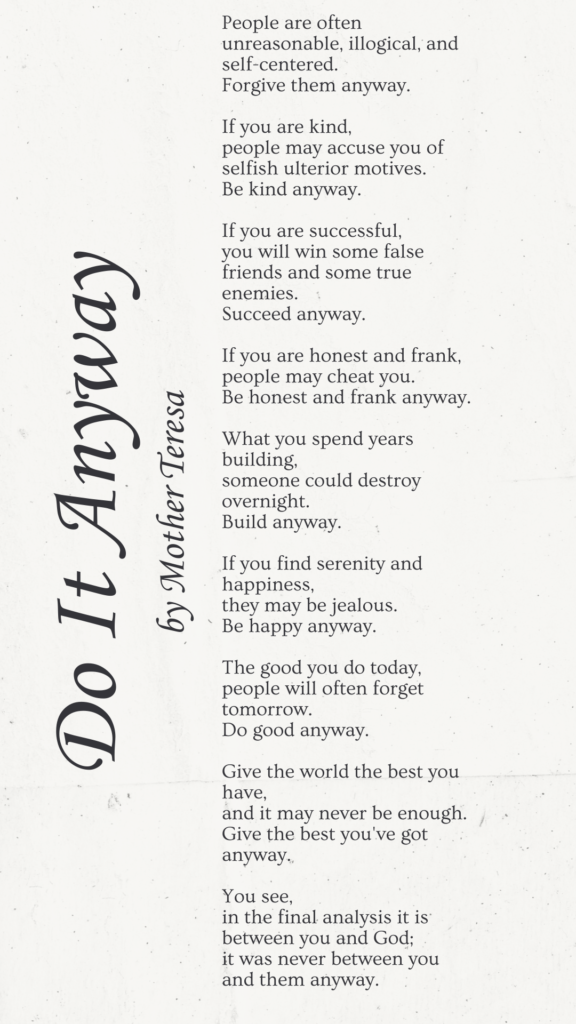In today’s self-centered world of likes and validation, it’s easy to become jaded and only help others when convenient. We expect our good deeds to be repaid with gratitude and praise. But decades before social media, Mother Teresa shared profound wisdom for anchoring our virtue internally, regardless of external reception.

Her inspirational poem “Do It Anyway” urges us to stay kind and honest even when people betray or reject us. By reflecting on the meaning of this poem, we can reconnect to what truly matters.
“Do It Anyway” Poem:
People are often unreasonable, illogical, and self-centered.
Forgive them anyway.
If you are kind,
people may accuse you of selfish ulterior motives.
Be kind anyway.
If you are successful,
you will win some false friends and some true enemies.
Succeed anyway.
If you are honest and frank,
people may cheat you.
Be honest and frank anyway.
What you spend years building,
someone could destroy overnight.
Build anyway.
If you find serenity and happiness,
they may be jealous.
Be happy anyway.
The good you do today,
people will often forget tomorrow.
Do good anyway.
Give the world the best you have,
and it may never be enough.
Give the best you’ve got anyway.
You see,
in the final analysis, it is between you and God;
it was never between you and them anyway.
The Meaning of “Do It Anyway”
Mother Teresa’s poem advocates adhering to our moral values for their own sake, not dependent on others’ validation. She argues that even when people are unreasonable, ungrateful, or hostile, we should respond with forgiveness, generosity, and truth.
The poem emphasizes that our morality is not about pleasing people or winning their applause. It’s about living our values with integrity because they resonate internally as right. We should do good anyway, even if people forget or don’t appreciate it. Our ethics are anchored in an eternal perspective beyond momentary human pettiness.
Lessons from the Poem
Several impactful lessons emerge from “Do It Anyway”:
- Be generous and forgiving without expecting anything in return – Give freely out of the goodness of your heart
- Stay true to your values even if others are immoral or don’t understand
- Don’t compromise your ethics or character in reaction to other people’s poor behavior
- Keep an eternal perspective oriented around God rather than human approval
- Don’t let temporary cruelty, ingratitude, or jealousy distract you from virtuous service
- Focus on living morally for its inherent value, not conditional on validation
- What you do matters, regardless of others’ reception or memory of it
About Mother Teresa

Mother Teresa was a Catholic nun who spent most of her life serving the poor in India. She founded the Missionaries of Charity organization which operates hospices, soup kitchens, counseling programs, and schools around the world.
Despite witnessing much suffering and living in poverty herself, Mother Teresa radiated love and compassion. She exemplified the principles in “Do It Anyway” through small acts of kindness each day. Mother Teresa called on us to spread light through little things, for it is in little things that great love is shown.
Her legacy centers on unconditional service and moral courage. She channeled an eternal perspective that allowed her to keep loving and giving despite rampant inhumanity.
Living the Lessons in Your Own Life
How can we apply “Do It Anyway” when it’s difficult to stay virtuous? Here are some suggestions:
- When someone is rude, take a breath and respond with empathy rather than anger.
- If you get attacked for an opinion, stand firm in your values respectfully rather than lashing back.
- When you don’t get credit for hard work, focus on intrinsic motivation rather than validation.
- If friends seem to take you for granted, examine whether to lovingly communicate or simply accept it.
- When jealous people try to sabotage you, stay kind and keep succeeding with integrity.
- If no one notices your efforts, remember your ethics are between you and your conscience.
- Keep planting seeds of goodwill through tiny acts of love. Their fruits may be unknown.
Conclusion:
In a cynical world, we may wonder if doing good is worth it when met with indifference or hostility. But as Mother Teresa’s poem reminds us, virtue is its own reward when untethered from validation. All we can control is living our values fully. The rest is not between us and other people but between us and God.





Actually, Mother Teresa did not write this poem. The actual author is Kent M. Keith
Kent says, “When I was 19, a college sophomore, I wrote a booklet for high school student leaders about the motivation and methods of working together with others to bring about change. That booklet included 149 words that I called “The Paradoxical Commandments.” The Paradoxical Commandments are guidelines for finding meaning in the face of adversity. The commandments subsequently spread around the world, until they had been used by millions of people in more than a hundred countries. The full story can be found at http://www.paradoxicalcommandments.com.”